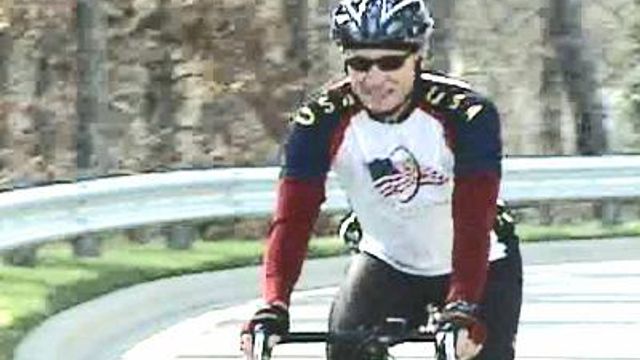DURHAM, N.C. — A Chatham County man has set out on a coast-to-coast bike ride. That's not so unusual by itself, but Drew Bratton is 64 years old and he's got a potentially dangerous heart condition called atrial fibrillation.
With atrial fibrillation, the heart's two upper chambers quiver instead of beating effectively. Blood can pool up and clot in the heart. The greatest risk is stroke.
However, Bratton's doctors at Duke University Medical Center have taken every precaution to make sure his cross-country quest is a safe one.
Bratton loves to put his body to the test in long-distance cycling. A year and a half ago, however, he felt the first symptoms of a problem while on a 500-mile ride across North Carolina. He was trying to climb a hill, he said, but he just couldn't muster the strength.
That's what led to the discovery that he has atrial fibrillation.
"It came as a real blow to me, and I struggled for about a year," Bratton said.
Bratton is not new to heart problems. Ten years ago, he learned he had a congenital heart defect with a leaky mitrial valve. Repairing it required open-heart surgery.
Dr. Magnus Ohman, a Duke cardiologist, said it's impossible to say how that might have contributed to Bratton's current condition. Like some edurance athletes, Ohman said, Bratton developed what's called an "athlete's heart." The heart adapts to extreme stress and, he said, sometimes that leads to an irregular heart beat.
However, over time after he diagnosed atrial fibrillation, Ohman watched Bratton improve his heart function. His progress fueled his lifelong dream to ride his bike 3,400 miles from California to Florida. His wife, Mary, didn't even object.
"I knew Drew would be back on his bike and doing what he loved because he's so determined to do that," she said.
A few years ago, Ohman never would have advised Bratton to do the ride, but now it's possible with medication and new remote-monitoring technology.
"Extreme levels of exercise require a fair bit of caution and monitoring to be sure that one can do so safely," Ohman said.
Twice a day, Bratton is recording his own heart rhythm with a device about the size of a cell phone. Then he transmits the recording to Duke over a phone. He'll also record his own vital signs and keep in daily contact with Ohman via e-mail.
If there are signs of trouble, the ride that began on Saturday is over.
"And that's something that I am prepared to do," said Bratton, who will be accompanied by a team of other riders.
Bratton plans to drink plenty of water, eat well and get plenty of rest. He's not your typical heart patient, but he believes he can be an example for others.
"Listen to what your doctor has to say, but enjoy your life and live every moment that you can," Bratton said.





